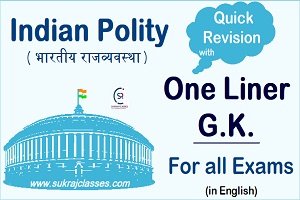
INDIAN POLITICAL SCIENCE- ONE LINER G.K. & QUESTIONS
![]() The pension of the judges of the High Court is charged from the Consolidated Fund of India.
The pension of the judges of the High Court is charged from the Consolidated Fund of India.
![]() Article 137 of the Constitution permits the Supreme Court to review its own judgement or order.
Article 137 of the Constitution permits the Supreme Court to review its own judgement or order.
![]() The Supreme Court of India was set up by the Constitution.
The Supreme Court of India was set up by the Constitution.
![]() The States Reorganization Act, 1956, divided the entire country into 14 states and 6 union territories.
The States Reorganization Act, 1956, divided the entire country into 14 states and 6 union territories.
![]() The titles and special privileges of the former rulers of the princely states were abolished by the 26th Amendment.
The titles and special privileges of the former rulers of the princely states were abolished by the 26th Amendment.
![]() The president of India constitutes a Finance Commission once in every five years.
The president of India constitutes a Finance Commission once in every five years.
![]() The article 280 of the Constitution describes the composition of the Finance Commission. It will have one Chairman and four other members.
The article 280 of the Constitution describes the composition of the Finance Commission. It will have one Chairman and four other members.
![]() An amendment of the constitution may be initiated by the introduction of a bill in either House of Parliament.
An amendment of the constitution may be initiated by the introduction of a bill in either House of Parliament.
![]() The Directive Principles of State Policy has been adopted from Irish Constitution.
The Directive Principles of State Policy has been adopted from Irish Constitution.
![]() Speaker of Lok Sabha has the right to decide whether a Bill is a money bill or not.
Speaker of Lok Sabha has the right to decide whether a Bill is a money bill or not.
![]() Attorney General of India is the first law officer of the country.
Attorney General of India is the first law officer of the country.
![]() The President can advance money to meet unforeseen expenses from the Contingency Fund.
The President can advance money to meet unforeseen expenses from the Contingency Fund.
![]() Article 352 of Indian Constitution has the provision for National Emergency.
Article 352 of Indian Constitution has the provision for National Emergency.
![]() Article 66 deals with the election of the Vice-president.
Article 66 deals with the election of the Vice-president.
![]() Parliament can remove the Vice-President from his office.
Parliament can remove the Vice-President from his office.
![]() The salary and allowances of the Governor are charged from the Consolidated Fund of the State.
The salary and allowances of the Governor are charged from the Consolidated Fund of the State.
![]() “G. V. K. Rao committee” on Panchayat raj is constituted in 1985.
“G. V. K. Rao committee” on Panchayat raj is constituted in 1985.
![]() A member of the council of ministers can hold office without being a member of the state legislature for a maximum period of six months.
A member of the council of ministers can hold office without being a member of the state legislature for a maximum period of six months.
![]() Six fundamental Rights are mentioned in Indian constitution.
Six fundamental Rights are mentioned in Indian constitution.
![]() President of India is the executive head of state in India.
President of India is the executive head of state in India.
INDIAN POLITICAL SCIENCE- ONE LINER G.K. & QUESTIONS

